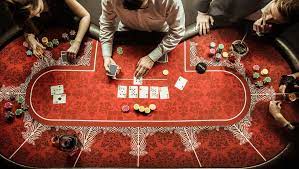Playing Final Four games is fun, but when it’s the national championship game in your blood, that usually shatters any illusion you have about not making it to the NFL. Everyone wants to be a part of the greatest team. When I say we want to be a part of the greatest team, I’m not talking primarily money or ego. I am talking about knowledge.
One of the biggest problems you will find is players and coaches alike, are overly focused on the money. That’s right, the money. Money is easy toImportant, it’s easy to get a verbal shout out during a pregame speech, but what about the knowledge that comes from the hard work of preparation, that little bit extra sharp feeling you get in your stomach when the clock is down and you’re really past all the game of luck? Well that’s mathematicians, that’s critical thinking and it’s also poker.
You can’t calculate the probability of a specific hand, or argue that a specific hand shouldn’t happen just because it’s the last hand in a tournament. That’s just part of poker, the excitement of taking that extra tiny edge over your opponent, the knowledge that at any moment, the rest of the table can flip a switch to make you a 20% favorite.
It’s really important to think about the probability of a hand happening, and not only that, what your own hand might be capable of. As a coach, you can see the error your team is making and that’s where you need to step in. Give a high dose of reality to what is actually going on right now. As the poker prodanvers, “that’s not a hand we want.” I would suggest starting right now to get a better handle on the probabilities involved in all facets of the game.
Primetime Television
When is the last time you saw a poker player on prime time television? I’d bet the last time was probably the World Series of Poker in the early 1970s. Then all the pros were on together and viewers followed each event. Today, poker is probably hottest topic on the planet and regularly appears on television.
There are newscasts dedicated to all things pokerace99. Chris Moneymaker, the 2003 WSOP champion, was the main story, but there are others, like Annie Duke, Chris Moneymaker’s brother, that get as much ink as the pros. These packages, which are usually two or three 30 minute segments, run for several minutes and earn their names recognition. One of the package stories, I’ll give you a minicamp.
It featured a live interview with a poker pro. Moneymaker was interviewed about his initial preference to play in the $2,500 No Limit Hold em event and how he truly began to understand the game.
anny green eye pants
Before I get into the substance of the issue, let me cheers for ESPN’s coverage of the $2,500 event. Annie Duke made an excellent point about money management and bankroll management. These are two extremely important themes that the average poker player can’t afford to ignore and those that do, are almost exclusively in the $5,000 to $10,000 range.
First of all, you have to determine a bankroll before the season even begins. You have to determine what your standard raise would be, based on your bankroll. Then you have to determine your desired opponent, based on how much your opponent’s bankroll is, as well as how large a percentage of your opponent’s bankroll you need to get heads up. I personally prefer low risk opponents with a low bankroll, but your spring-board point to adjust.
Secondly, you really must be getting prospective bookmakers lines and odds in order to make the wagering decisions that tell you how to play your bankroll. Many new players have trouble committing to anything other than a specific ace, king, and a high card. If you are looking at a Ladbrokes bet, it looks like this:
You like bet $20 to win $40.The underdog bet $20 to win $40.You have 3 callers.The odds are even.
You bet $60 to win $80.The underdog bet $60 to win $80.
You bet $200 to win $80.The underdog bet $200 to win $80.
You bet $40 to win $80.The odds are even.
You bet $200 to win $80.The underdog bet $200 to win $80.
You bet $80 to win $80.The odds are even.
You bet $80 to win $80.The underdog bet $80 to win $80.
You bet $160 to win $80.The odds are even.
You bet $160 to win $80.The underdog bet $160 to win $80.
